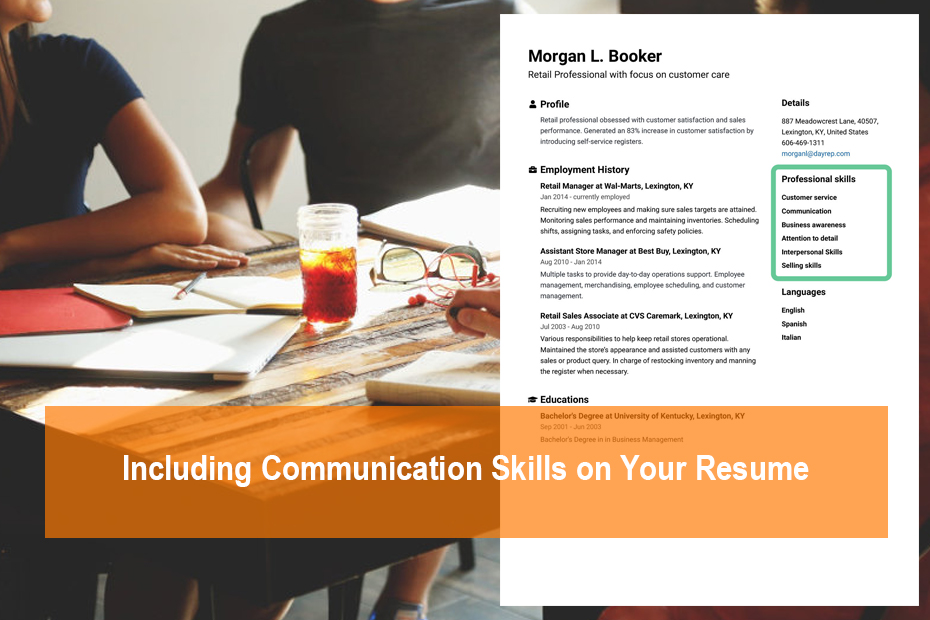Including Communication Skills on Your Resume
Communication skills are one of the most valuable skills employers seek because it is at the center of many professionals and plays an important role in many. However, being a good communicator is not enough when looking for a job. To show your talents to potential employers, you need to show your communication skills on your resume.
Should you add communication skills to your CV? Yes, no matter what industry you work in, it is important to communicate effectively with other people, be it your colleagues, supervisors, customers or customers. Most professions involve a range of communication skills, including sending emails and talking on the phone. Even the job search itself requires effective communication.
Anyone can easily add communication skills keywords such as “team player”, “careful listener”, “confident speaker” and “excellent communicator” to their CV. However, as it is easy to claim to have these skills, it is unlikely to persuade employers.
Instead, it’s better to show your communication skills on your resume by highlighting the needs of past jobs or when you excelled in a situation. Using a resume builder to incorporate communication skills is the most time efficient way.
How to Emphasize Communication Skills on Your Resume
Like your other abilities in your resume, your best communication skills must be demonstrated through your professional background. There are some basic communication skills that are important to most positions, but some jobs require some specific skills. Jobs that require strong communication skills include teachers, managers, nurses, waiters, psychologists and salespeople.
The first step is to read each job description carefully and highlight the necessary communication resume skills. You will need to write a slightly different resume for each job application.
Think about what you’ve achieved and how your communication skills have contributed to your success. Then you’ll be able to truly show off your abilities by adding examples of communication skills instead of just claiming to have them.
For example, being involved in your career achievements, where you give presentations, give training sessions, work as part of a team, resolve customer complaints, or lead a project, demonstrates that you have key transferable skills. Learn how to format a resume that best emphasizes your strengths.
![Communication Skills for Resumes [10 Effective Examples]](https://resumegenius.com/wp-content/uploads/2019/06/substitute-teacher-communication-skills.png)
Top 15 Communication Skills for Workplace Success
If you can clearly show that you have strong communication skills on your resume, you will increase your chances of getting a first interview as these are some of the best skills to put your resume on. Think of each point in the list of communication skills below and think of examples of when you demonstrated them. How do you list communication skills on a resume?,#How would you describe your communication skills?,#What do I put for skills on a resume?,#What are your top 5 skills?,#What are professional skills?,#What are the five effective communication skills?,#How do I say I have good communication skills?,#How do you show communication skills in an interview?,#What are excellent communication skills?,#What are your skills examples?,#How do you describe customer service skills on a resume?,#What are the 7 C’s of communication?,#What are the effective communication?,#How good are your communication skills?,#How can I develop my communication skills?,#What is communication skills and its types?,#What are good verbal and written communication skills?,#What are five hard skills?,#What are your top 3 strengths?,#What are the top 10 job skills?
1. Writing
Writing is a daily part of many jobs and an important part of communication. Most office work and call center jobs include writing emails and written communication with colleagues. What did you write for who? What has he achieved? Include this in your resume.
2. Mentoring
Providing one-on-one guidance shows that you have a range of important interpersonal skills, such as listening, empathy, giving advice and feedback. You can use a bullet in your resume to highlight the progress of the individual.
3. Negotiating
Besides the obvious financial benefits, good negotiators offer companies the ability to persuade other people. This includes clearly scoring and reading other people (non-verbal communication). You can add this to a job description or the achievements section of your resume.
4. Oral communication
Verbal communication skills are essential in most jobs and are essential for any role that includes customer service, sales, public relations, and talking on the phone. If verbal communication has taken place in your past job roles, you should emphasize this as it shows that you maintain your social skills.
![Cashier Resume [2020] - Professional Guide & Examples](https://d.novoresume.com/images/blogs/1bd044c0-5e62-11e8-83e5-078e8cc60425/cashier-resume.png)
5. Training
Conducting training sessions requires a range of communication skills. To get their attention, you must be able to engage an audience. It shows that you are comfortable speaking in public and are able to communicate ideas and concepts to others.
6. Teamwork
Being an effective team member includes being able to communicate with your colleagues and share your ideas. You need to have good listening and verbal skills to collaborate with others. If you have worked like it, you should add it as one of your resume communication skills.
7. Presentations
Making presentations shows that you can interact with large audiences. It shows you have a range of skills, including verbal communication. It is an impressive ability to maintain communication as not everyone is comfortable speaking in public and is important to many jobs.
8. Empathy
Communicators who can empathize with others understand both how someone feels and why they communicate, and how to respond. Empathy not only helps you read the room in team meetings but also helps you gain perspective and understanding that helps you communicate.
9. Listening
If you can listen to someone and accept everything they say, you can communicate well. Communication with people is not just about talking. In fact, most of the time it’s about listening. This applies to both employees and bosses. Communication is a two-way street and everyone should be open to listening.
10. Sense of Humor
It’s probably a little daring to list this on your resume, but it totally depends on the type of job. Communicating with a sense of humor can be a good way to keep things open and make things more positive or fun. However, part of this communication skill is knowing when it’s appropriate to use humor in speech.
11. Compassion
If you can’t communicate compassionately, people can be offended when sensitive topics are told insensitive. It’s important to take into account everyone’s feelings when presenting ideas, implementing changes, and talking directly to others.
12. Patience
Everything doesn’t always go as planned. Patience is a communication skill that helps us to communicate calmly and balanced. If you can be patient, wait for others to respond to you or for someone to finish speaking and your communication will improve significantly. This feature keeps you calm and protected, which prevents your brain from being shaken. Patience will allow you to construct your thoughts productively and communicate consistently.
13. Positivity
If you communicate positively, your energy will return and it will have a positive effect on others. Positivity is also a good communication skill that helps to persuade others. It works as a tool of persuasion and can help others look at the bright side of the point you are making.
14. Confidence
Communicating with confidence allows you to be taken seriously (… depending on where you are doing) and helps others to listen. If you communicate your opinion reluctantly, others may not listen or accept your opinion. Believe in yourself, have confidence in yourself and your communication will improve instantly.
15. Open-Mindedness
Communicating with an open mind is the best way to suggest ideas, get feedback, or participate in discussions. Sometimes we imagine our responses as we plan our suggestions and suggestions. Since we don’t always get these expected responses, it’s better to have an open mind in any communication situation. Keeping an open mind also helps us make other suggestions and try new things.














Comments